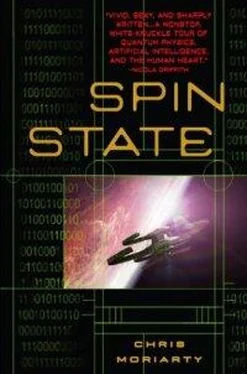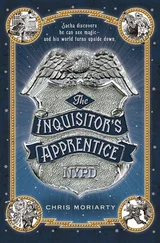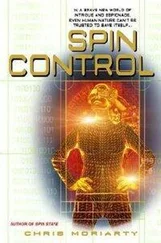Li turned the interface over, looking for a maker’s mark or serial number. She felt a slight roughness under her fingers on the underside of the dry socket. She turned the wire over and saw a stylized sunburst —the same one she had last seen on the floor of the Metz laboratory.
“Kolodny,” she breathed, as a choking panic boiled up inside her.
Her internals fought it. Cognitive programs lurched into action, vetting meat memory, sorting out immediate threats from remembered ones, shunting the images that had triggered her panic into firewalled compartments where they could be hormonally adjusted—or, in the worst case, purged. Endorphins pumped through her system to combat the sudden rush of adrenaline. Once again, she wondered just how crazy she would be when the psychtechs were finally done with her.
Half a minute later her breathing was back to normal. Two minutes later her psych program flashed Kolodny’s face across her internals.
Li expected this, had prepared for it. She sorted stubbornly through one of Sharifi’s fiche piles, breathing and pulse even, until the diagnostic program finished its prying and Kolodny’s picture faded behind her eyes.
Mother of Christ , she thought in the dark corner of her mind she’d always managed to keep from the psychtechs. Were the panics and flashbacks just normal long-term jump effects? Or were they malfunctions spawned by the kinks she’d put in her own systems to hide her damning preenlistment memories? She didn’t know, and there was no one she could ask.
Except Cohen, maybe. But Metz had killed that.
She leaned forward, putting her head between her knees to dispel the spinning nausea of the flashback. That was when she saw it: a yellow-white rectangle wedged against the wall between the bed and the desk. She fished around until she got hold of the thing and lifted it up.
A book.
She inhaled its dust, its smell, fingered the acid-gnawed paper. It was a cheap paperback, the kind still printed in the poorer Trusteeships. And this one was from Compson’s now-defunct university press. She turned it over and grinned as she saw the author and title: Zach Compson’s Xenograph .
It was a classic, of course—a book that had seized on people’s imaginations so strongly that they still called Compson’s World by the flamboyant New Zealander’s name, while the anonymous long-distance survey team that actually discovered the planet had been consigned to oblivion.
She let the book fall open at random, and read a passage that Sharifi or some prior owner had underlined:
There was a man who had a stone that sang, they told me. Everywhere I went they talked about this stone. Where it came from. What it meant. How he came to find it.
They told me there were cathedrals in the earth’s dark places. Rooms where the glass bones of the world hold silence like a river, where stones whisper the secrets of the earth to each other. And those who hear them stay and listen and sleep and die there.
But a few come back. They walk out of the mountains singing. With stones in their hands.
This is what they told me, but I never found the man.
“Glory holes,” Li muttered. “He’s talking about glory holes.” She flipped through the book. It was dog-eared, tattered. Someone had read it again and again, starred and underlined favorite passages.
Had Sharifi known about the glory hole before she came? Had she seen something in Compson’s half-mystical ramblings about glass bones and singing stones that no one else had seen? Was that what had brought her back to Compson’s World?
Li set the book on Sharifi’s desk. She stood up, put the wet/dry interface back in its case and tucked it into her uniform’s kangaroo pocket, along with Sharifi’s datebook. She started toward the door. Then she turned around, picked up Sharifi’s battered copy of Xenograph , and put that in her pocket too.
She set the security seal to notify her if anyone else entered, walked back to her own quarters, pulled on clean shorts and a T-shirt, and collapsed on her narrow bunk without even managing to get herself under the covers.
* * *
She couldn’t have been asleep ten minutes when the icon for the peepers in Haas’s office toggled, waking her.
She maximized the feed from her skinbugs, and there was Haas, in shirtsleeves, standing behind the luminous desk.
He was talking to someone: a slight figure, whose face was half-turned away from Li. Even in the dim light, Li could make out the pale skin, the dark hair falling over shoulders as tense and frail as bird’s wings.
“I didn’t tell her,” the witch murmured. “I swear it. I haven’t told anyone.” The tension in her voice was unmistakable.
“You’d better hope you haven’t,” Haas answered.
He raised his hand, and the woman flinched as if he’d hit her. Even Li, lying in bed three spokes away, tensed for the blow she thought was coming.
Haas turned away and shrugged. “Christ,” he said. He walked out of the field of the peepers, and Li heard the clink of ice against glass as he poured a drink. “What a day. I need to relax.” A pause, Haas still out of sight. “Come here.”
The witch turned, but she moved so slowly that Haas was back at the desk before she could take more than a step toward him.
“Take that off,” he said.
She undid her robe and let it slide to the floor.
“Lie down.”
She lay back across his desk, passive as a child.
“No,” he said. “Not that way.”
He reached across her, into a desk drawer, and pulled out a wetware case. He bent the witch’s head sideways, inserted a jack into an unseen socket, then attached the contact derms at the other end of the wire to his own forehead and ran the wire through his desktop VR rig.
What happened next was something Li had heard about but never actually seen: a loop shunt, a perversion of the technology every company in UN space used for training spins. Loop shunts were illegal; they’d been banned after that girl bled to death in Freetown. But the psych wards in every spaceport were still full of prostitutes who’d burned their neurons out or cut themselves up or just plain gone crazy using them.
Li shut the feed off, but she couldn’t rid herself of the image burning behind her eyelids. Haas’s hands on that white skin. The witch lying across the desk, her long hair spilling over the gleaming condensate, her body moving but her eyes as empty as the black void beyond the viewports.
Li rolled over, giving herself up to sleep.
It was a long time coming.
When she turned on her livewall the next morning the news of Sharifi’s death had broken.
Even NowNet had been caught off guard, it seemed. They were gearing up for the event, dragging in colleagues, students, distant relatives. But they were using stock feed, old stuff. It was as if Sharifi had dropped off their radar. Coincidence? Or a sign that Sharifi had had reason to lie low in recent years?
So far the press was sticking to the unfortunate but unavoidable accident angle—though Li couldn’t help wondering how much of that was the truth and how much of it reflected astute maneuvering by Nguyen’s spin flacks.
Not that it made any real difference to her job. Not yet, anyway. Not unless she screwed up and let the press unearth some piece of the puzzle before she and Nguyen had time to plumb and measure and sanitize it. For the moment, she still had the same clues in hand she’d had when she lay down the night before.
A death. A fire. A missing dataset. A piece of wetware whose presence in Sharifi’s quarters could mean anything or nothing.
Li ran her search from her own quarters. She had some privacy there at least, and she didn’t relish the thought of surfacing after a long streamspace run to find herself slumped over her desk or passed out on the duty-room sofa.
Читать дальше












